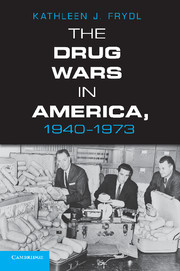6 - The Cost of Denial
Vietnam and the Global Diversity of the Drug Trade
Published online by Cambridge University Press: 05 April 2013
Summary
Throughout the 1960s and early ’70s, the U.S. government adopted a punishment and prohibitive approach to deal with illicit drug consumption. In so doing, lawmakers demonstrated considerable faith in the formal mechanics of governing, as they cobbled together dramatic legislative overhauls, reorganized and added new layers to the federal government, and issued impressive public vows to stem the tide of illicit drug traffic and use. At the same time and in other areas of American life, public confidence in the instruments and institutions of state power declined precipitously, so much so that observers dubbed the country’s frustration a “crisis of liberalism,” a widespread disillusionment with key tenets supporting the governing coalition that held power for decades by espousing government manipulation of the economy through interest rates and taxes, social policy benefits for special communities, and Cold War containment policies abroad.
By far the most painful reckoning for the country in this unfolding “crisis” was the U.S. government’s intervention in South Vietnam, originally undertaken to forestall communist assumption of power that would likely follow reunification with the North. This decade-long military deployment, launched at the height of Camelot idealism and initially presented as a noble cause, soon became a dispiriting stalemate and, finally, an ignominious and costly defeat. No other saga captured the predicament of state power so completely as the agonizing revelations prompted by U.S. intervention in Vietnam: the government had lied to its people, embraced quixotic and convenient beliefs, sent soldiers to die in a war waged with conflicting tactics and without strategic purpose, and caused the suffering and death of tens of thousands of Vietnamese. Unmasked in its brutality and humiliated by withdrawal and defeat, American power stood revealed as fragile and suspect.
- Type
- Chapter
- Information
- The Drug Wars in America, 1940–1973 , pp. 366 - 417Publisher: Cambridge University PressPrint publication year: 2013



